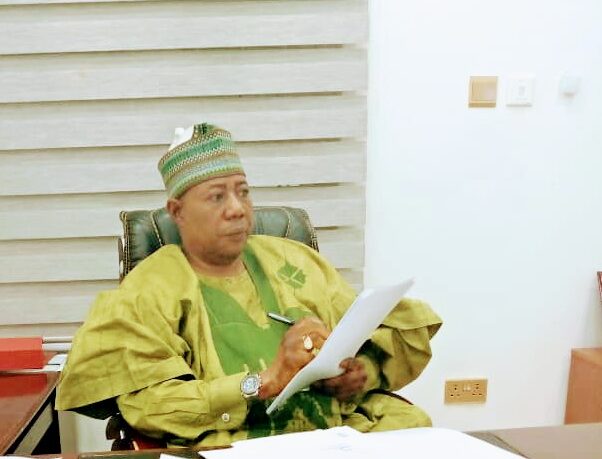“There is no doubt, with the profound judgment of today, that our electoral jurisprudence and constitutional democracy are further consolidated and embedded more indelibly in our national identity because of the diligence and undaunted professionalism of the Honourable Justices who presided over the matter.”
The above quote were the words of President Bola Ahmed Tinubu reacting to the Supreme Court verdicts delivered on January 11, 2024.
Experts have agreed that a strong rule of law is a powerful engine for democratic growth. By fostering trust, accountability, equality, predictability and peaceful conflict resolution, it paves the way for a more just, stable and prosperous democratic society. Clearly, the foregoing is President Tinubu’s mission statement.
It is no longer news that the Supreme Court of Nigeria, on Thursday January 12, 2024, took the whole country by storm with landmark judgements on governorship election disputes in eight states. What is the talking point however, is that the judgements have rekindled the time-tested saying that “judiciary is the last hope of the common man.” Needless to reiterate that these verdicts came as a soothing relief for Nigerians at a time some are beginning to question the integrity of the country’s judiciary.
Against the backdrop of the ovations that are yet to die down, let me draw a clear line between the past and what has just happened. The concept of separation of State powers presupposes that the executive, legislature and the judiciary are independent of each other, but cooperate to keep the wheels of governance whinning smoothly. However, over time, we have seen the power of the judiciary to adjudicate eroding gradually due to the overarching influence of the executive.
With Thursday’s Supreme Court verdicts, the tides are starting to turn, and this commendation should squarely land on President Tinubu’s table. The eight states and governors and their cases which verdicts were delivered are Abba Yusuf (Kano), Caleb Mutfwang (Plateau), Bala Mohammed (Bauchi), Alex Otti (Abia), Dauda Lawal (Zamfara), Francis Nwifuru (Ebonyi), Bassey Otu (Cross River) and Babajide Sanwo-Olu (Lagos).
Statistics from the foregoing shows judgements in three states favouring the president’s party, APC, while opposition parties triumphed in five states. Some may be tempted to ask: why giving credit to Tinubu for the good deeds of another arm of government? If you are a student of Nigeria’s political history, you won’t bat an eye-lid to give credit to the president.
Needless to remind cynics that it was in this country that a sitting president once declared: “Election is a do or die affair. It is also in this country that judges are made to deliver judgements at gun point, to say the least. It is also in this country that residence of Supreme Court judges are raided while they are asleep. It is also in this country that a candidate who came fourth in an election was declared winner at the Supreme Court because of untold pressure.There’s enormous power at the disposal of the president to exploit in order to cow the judges to do his biddings but Tinubu won’t subscribe to none of that.
Not only did Tinubu ensured non-interference, he also reacted to the judgments thus: “I want to reiterate that my faith in our nation’s judiciary has never been shaken, not even for a moment because I know that our hallowed courts of law will not fail to administer justice to all Nigerians in all matters and at all times.”
This is so strange that some members of President Tinubu’s own party started accussing him of trading off some states with the opposition parties. It took the APC deputy national organising secretary, Nze Chidi Duru, to clarify the stand of the party on the issue of the rule of law.
This is overwhelming and very rare in the history of electoral litigation in Nigeria. This is the political system Tinubu wants to midwife and it speaks volume of his own political credential as a core democrat. Not too many sitting presidents would so grant the judiciary free hand to the extent of his own party losing strategic states like Kano and Plateau, among others. This has demonstrated Tinubu’s eternal belief that politics should be left at the level of fair debates and not a do-or-die affair. Now that the rule of law is beginning to take centre stage in our democratic development, better days are here at last. The idea is that a strong and fair legal system where everyone plays by the same rules is essential for democracy to flourish.
Down memory lane, suffice to remind Nigerians that Tinubu is not new to championing the course of democracy. His refusal to interfere with the processes at the Supreme Court only revalidated his stand and struggles of the last 30 years. As one of the arrowheads of National Democratic Coalition (NADECO), Tinubu and other activists brought General Sani Abacha’s military junta under severe pressure to return Nigeria to democracy.
He paid personal prices for standing for democracy. He only escaped incarceration or the bullet by the whiskers, as some of his comrades like Pa Alfred Rilwane were not lucky. When the heat became too much and the authorities were closing-in on him, he had to escape to self-exile, albeit, through the NADECO route. No price is greater than this.
It is heartwarming that even opposition governors are commending President Tinubu for this rare display of statesmanship. For instance, Abia State governor, Alex Otti, thanked the president for allowing the judiciary to discharge its duties independently which saw him and other governors win their cases at the Supreme Court. Otti went on to describe Tinubu’s non-interference in the judiciary as positive results in the country. Permit me an excerpt: “I want to thank His Excellency, the President of the Federal Republic of Nigeria, Senator Bola Ahmed Tinubu, for remaining firm to the resolve that the judiciary should be independent.”
By this, it is clear to Nigerians what President Tinubu’s intentions are for the country. All that is required of us as Nigerians is redoubling our support for the Renewed Hope government as it strives to strengthen our judiciary because if this becomes a norm, the following happens:
1. Legitimacy and trust: A robust rule of law will foster trust in the government and its institutions. When laws are applied fairly and consistently, citizens feel that their rights are protected and that they have a voice in the decision-making process. This trust is crucial for the legitimacy of a democracy, as it encourages peaceful participation and discourages conflict.
2. Accountability and check on power: The rule of law serves as a check on the power of the government, preventing it from acting arbitrarily or beyond its mandate. Independent courts and law enforcement agencies will ensure that even the most powerful officials are held accountable for their actions and cannot abuse their authority. This prevents the concentration of power and protects democratic principles.
3. Equality and inclusivity: A strong rule of law protects the fundamental rights of all citizens, regardless of their background, social status, or political beliefs. This wull ensure equal treatment under the law and promote inclusivity within the democratic system. When everyone feels protected and empowered to participate, it strengthens the overall health and stability of democracy.
4. Predictability and stability: Consistent and predictable legal frameworks offer a foundation for economic growth and development. Investors are more likely to engage in a country where the rule of law is strong, as they have greater confidence in the fairness and transparency of the business environment. This economic stability, in turn, can contribute to the sustainability and success of a democracy.
5. Conflict resolution and peaceful transition: A robust legal system provides mechanisms for resolving disputes peacefully and within the established rules. This prevents conflict from escalating and helps to ensure smooth transitions of power, even during times of political uncertainty. This reinforces the democratic principle of peaceful transition and strengthens the system’s resilience.
Of course, the relationship between rule of law and democratic growth is complex and multifaceted. While a strong rule of law is vital for a healthy democracy, it is not the only factor at play. Other factors, such as a vibrant civil society, a free press, and a strong system of checks and balances are also essential. Additionally, there can be challenges in ensuring that the rule of law is genuinely applied to all citizens, especially in countries with long histories of inequality or political oppression.
Overall, the evidence overwhelmingly suggests that a strong rule of law is a powerful engine for democratic growth. Fostering trust, accountability, equality, predictability and peaceful conflict resolution paves the way for a more just, stable and prosperous democratic society.
In conclusion, let me point out here that the Tinubu Renewed Hope administration is not doing this for political reasons. The president is neither currying favour nor buying respite from the fiercest of his critics and implacable opponents. Rather, he is undertaking these course of actions because it is the right thing to do to wriggle the country out of years of decay and backwardness. He is aware that adhering strictly to the rule of law is the soothing balm that Nigeria direly needs now. To this effect, the commander-in-chief is also Nigeria’s healer-in-chief.



